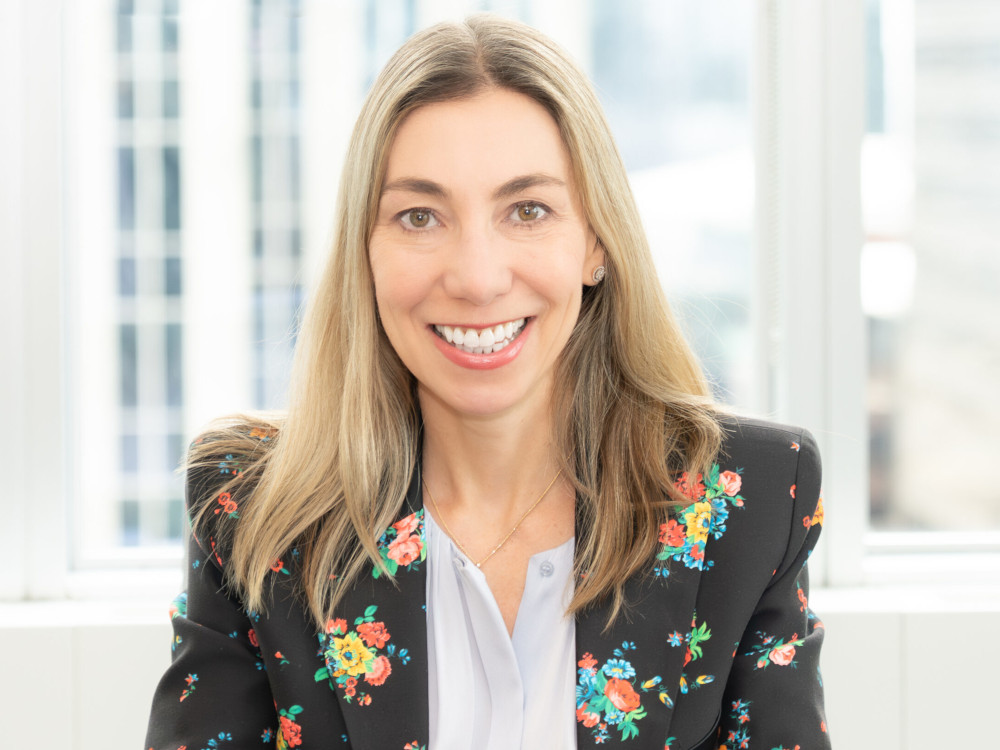This is the last in a series of articles in our month-long special report, “Women in Family Offices.” To view all the articles, click here.
Serving the investment needs of affluent families means more than portfolio management for Marjorie Skolnik and the all-woman leadership team at Coriel Capital Inc. in Montreal.
Related video: Watch our panel on Women in Family Offices
The company is an outsourced chief investment officer (OCIO) that manages and administers a family office’s investments, providing an institutional approach to wealth-management requirements. Coriel was founded in 2006 by investment industry veterans Gisele Wilson and Alexandra Ryan, who each had long histories in the institutional space and now serve as managing directors alongside Skolnik.
In 2023, the company was acquired by CI Financial to join its Canadian private wealth management arm.
Today, Coriel has a staff of nine and serves 17 client families, most of them spanning multiple family members and generations. Each has an average of just under $100 million invested, totalling some $1.5 billion in client assets.
Before joining the boutique wealth-management firm eight years ago, Skolnik worked in senior roles in institutional financial markets. She was director of global equity derivatives at National Bank Financial Markets, helping corporations hedge their interest rate and foreign exchange risk and structuring investment funds. She began her career at Scotiabank Global Banking and Markets, transacting interest rate derivatives with global central banks, treasurers, pensions, insurers and hedge funds.
Skolnik spoke to Canadian Family Offices about the qualities and practices that make Coriel unique in the OCIO space—and how its clients are responding.
What’s different about Coriel as an OCIO?
Our firm is unique in that we work directly with client families, as well as working on all of the investment research and oversight. That gives us a lot of in-depth knowledge of the investment strategies held and also accountability when we’re speaking to our clients, because the buck really stops with us.
Why do it that way?
We began as a very small team, in startup mode, where everybody was responsible for everything, and it just evolved that way. Given that we’re a firm staffed by senior investment experts, we really felt that we needed to double down on the investing piece and for everyone to have a solid understanding of all these moving pieces in the portfolio and what their role is. And also to understand the client motivations.
You note in your marketing that you ‘dismantle the mythology surrounding investing’ and that ‘ultra high net worth families have long overpaid for access to mediocre investments.’ What do you mean?
There’s a lot of complexity and fads that come in and out of favour in the investment space. And there are many different ways to get from point A to point B. We take a very low-volatility, consistent approach. All of the discussions that we have with our clients and all the recommendations we issue to them are focused on an investment policy. We review our client investment policies every year—that’s truly the road map to where they’re going—and we don’t modify that policy based on market conditions.
What is your goal in investing for these clients?
Our goal is capital preservation and prudent growth over time. So we focus on portfolios that will deliver attractive returns, net of all fees, without a tremendous amount of volatility.
One of the reasons investors tend to overpay is that often the investment advisors don’t have a tremendous amount of conviction, so they end up adding a high number of investments into the portfolio, which boils down to an indexing approach. To pay active-management fees and get the index doesn’t make any sense.
How many investments are in your client portfolios?
Portfolios of this size might typically have up to 100 positions. With our clients, it tends to be less than half of that, including all of the private equity funds, etc., which each represent their own line. And then we put our arms around the whole thing.
This is anecdotal, but I think clients may feel a sense of ease, or that they’re not being judged, when talking to women.
Some clients come to us with legacy positions that they will maintain for some amount of time. We’ll build around that and complement. But we really help them make sense of the total, so not only having a plan, but also having comprehensive reporting that lets them know what return are they making, what’s contributing, what’s detracting, which naturally happens when you’re in a diversified approach.
How did Coriel develop as a women-led firm?
When Gisele and Alex founded the business 18 years ago, there were very few senior women in the financial markets. It was really just a consequence of two women having worked together, having had great chemistry and identifying a gap in the market where they had dealt with pensions and endowments that were sometimes smaller than the portfolios of some ultra-high-net-worth clients, but there were ultra-high-net-worth clients who were paying two and a quarter per cent per year to be in mutual funds. They really felt that that part of the market was underserved.
Then the business continued to evolve with women in leadership roles?
There was never a focus on hiring and retaining women, it really just boiled down to finding people who are curious, who are capable, who really love investing and who want to do things our way, which is maybe with a little bit more prudence and patience and debate around the decisions that get made. It’s not a gender-focused hiring process, it just kind of turned out this way. We’ll continue to look for excellent, curious, rigorous people to continue building out our team.
Can women have an advantage in your business?
This is anecdotal, but I think clients may feel a sense of ease, or that they’re not being judged, when talking to women. When we are explaining an investment and they don’t understand an aspect, they’ll candidly ask. They won’t hesitate for fear of sounding silly.
What does the fact that Coriel is now within the CI Private Wealth Canada ecosystem mean to your clients?
It’s meant very little, because what they see is really the exact same interaction that they had with us as before. It’s enabled us to spend more time researching investments, training up our new hires, trying to work some new tools into our process, things that will enhance the client portfolios and the client experience.
So CI plays an administrative role?
Correct, all the non-core business functions are now largely dealt with by CI, which for us is a tremendous win. Meanwhile, we have full autonomy over the investment process.
The only compensation Coriel receives is directly from our clients. We have no funds, no products of our own and we also don’t receive any kind of trailer or compensation from the investment managers that we select. Everything is fully objective and transparent.
What investments do you specialize in?
We don’t specialize. Something that’s unique about us is that we take a global approach. We hire investment managers as core positions who are experts in doing one thing and one thing well. We have low-risk fixed income for the liquidity sleeve of our clients’ portfolios. We have global public equity, so our managers are able to select the best opportunity, regardless of where the company is headquartered. We think that that’s a much more sane approach than trying to split it up geographically and have experts piecing things together in their own regions. We like them to be able to be opportunistic and shift where the best companies reside, and then we look for investments that are excellent, that are great diversifiers to a client’s portfolio, that modify the risk profile in a good way. And we will seek that out in any asset class—private equity, infrastructure, real estate, opportunistic credit. We really will go the gamut.
How are decisions made in your firm?
We are known for our investment due diligence and portfolio management discipline. Our backgrounds and time spent in the investment management industry have given us a basis for a different kind of conversation with the managers included in, or under consideration for, our portfolios.
What’s special about how you interact with family offices?
We are deeply involved in the non-investment concerns of the families we work with. We participate actively and regularly in estate and tax planning discussions, ensuring the portfolio supports the plan. We work closely with family members to educate the next generation. We collaborate with our clients’ trusted advisors, such as accountants, lawyers and the in-house family office team, so all decisions are informed and appropriate. We are a sounding board for the families to discuss anything, whether it is part of the investment mandate or not. We want to provide them with what they need to accomplish their goals, period.
How are investment decisions made?
We work with the family on a non-discretionary basis. So nothing is happening behind a curtain where they meet with us at their quarterly review and we say, ‘We bought this investment, we sold this one, and this is why.’ Everything is in consultation before an action is taken in the portfolio. Once we’ve concluded our due diligence, we issue a written recommendation, summarizing what we’ve learned about the strategy and why we believe it’s an appropriate addition.
And for the clients who will implement it, we explain to them, within the context of the portfolio, how that would be done, and we are there to answer any questions they have. It’s a consultative process. It’s empowering for them. It helps the next generation get up the learning curve, gain a comfort with investing, feel that they have input and value into the process, which we think is really important. We’ve found that different families have different personalities, so this process resonates with them in different ways.
What trends do you see ahead in ultra-high-net-worth investing?
There are many new entrants into the space from different backgrounds and experiences. I think the challenge for families is that they’ll be approached with so many more potential service providers and offerings that they’re really going to have to do their homework to separate the wheat from the chaff.
A growing number of families are also looking for something a little bit more customized, personalized. They want to dip a toe into alternatives, but they want to do it in the right way. It demands quite a bit of experience and work to figure out how to accomplish that effectively.
There are expectations of volatility ahead. Is that a concern for your clients? Or will a portfolio with the right asset mix weather the storm?
Exactly. We don’t try to prognosticate, because that’s an impossible feat. Our true belief is if we have properly constructed portfolios with a suitable investment policy, and excellent managers working within their asset class to seize opportunities when there’s a dislocation, that’s a great win for our clients.
The Canadian Family Offices newsletter comes out on Sundays and Wednesdays. If you are interested in stories about Canadian enterprising families, family offices and the professionals who work with them, but like your content aggregated, you can sign up for our free newsletter here.
Please visit here to see information about our standards of journalistic excellence.




